한국에 이어 미국 공영방송 예산 삭감 논란: “NPR·PBS 위기 맞나”(Trump Administration Seeks to Cut Over $1 Billion in Federal Support for NPR and PBS)
백악관, “공영방송 예산 11억 달러 환수” 요구 계획
백악관이 공영방송에 배정된 11억 달러 규모의 예산을 의회에 환수(rescission) 요청할 계획이다. 이는 NPR과 PBS 등 공영방송의 핵심 재원을 사실상 2년치 삭감하는 것으로, 농촌·소외지역 방송국을 중심으로 심각한 운영 타격이 예상된다. 예산 회수 조치는 공영방송의 정치적 편향성 논란 때문이다.
트럼프 행정부와 공화당 일부 의원들은 공영방송이 편향적이고 시대에 뒤떨어졌다고 비판하지만, 공영방송 측은 “지역 시청자·청취자를 위한 필수 공공서비스”라며 강하게 반발하고 있다.
The White House is poised to request a rescission of over $1 billion in federal funds earmarked for public broadcasting, potentially stripping NPR and PBS of nearly two years’ worth of core funding.
This proposal, part of a broader plan to cut various programs, would significantly impact local stations—particularly in rural areas—which depend on public media for critical news and information. While administration officials argue that modern technology renders such services obsolete, public media advocates insist these cuts could devastate essential public services for underserved communities.
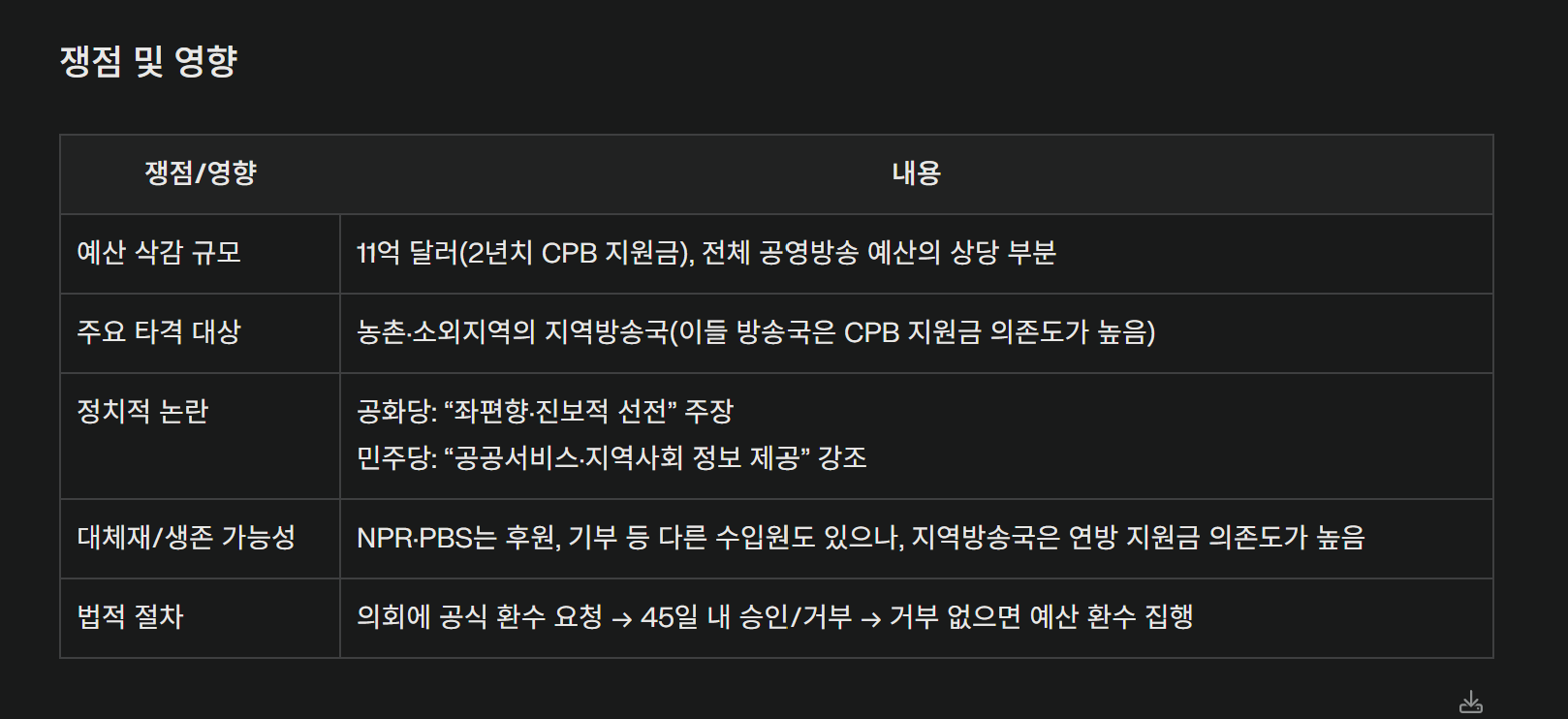
“미국, 공영방송 투자 세계 최하위 수준…민주주의 인프라로도 봐야”
PBS에 따르면 미국은 인구 1인당 공영방송에 투자하는 금액이 연방 차원에서 연간 1달러 50센트 정도로, 주요 선진국 가운데 거의 꼴찌 수준이다. 영국 국민은 BBC를 통해 연간 1인당 약 100달러를 지원받고 있으며, 북유럽 국가들은 이보다도 훨씬 더 높은 금액(연간 1인당 100달러 이상)을 투입한다.
이런 투자 격차는 공영방송 시스템의 ‘건강도’에서도 고스란히 드러난다. 영국이나 북유럽 국가들은 공영방송을 “민주주의 인프라”로 간주해 안정적으로 예산을 확보하고 있으며, 여러 연구에 따르면 공영방송 체계의 건전성이 민주주의의 질과도 양의 상관관계를 보이는 것으로 나타났다.
“U.S. Public Media Funding Trails Far Behind Other Countries”
The United States allocates roughly $1.50 per person per year in federal funding for public media—an amount that barely registers on the global scale. In contrast, British citizens receive about $100 per person annually for the BBC, while Northern European countries spend well over $100 per person per year on their public broadcasters.
This discrepancy is clearly reflected in the overall health of public broadcasting systems. Many European nations regard public media as “essential democratic infrastructure,” and evidence suggests a strong positive correlation between a robust public broadcasting network and the health of democratic governance.
한국도 유사 사례
한국 역시 공영방송제도를 운용 중이며, KBS(한국방송)를 비롯해 EBS(교육방송) 등이 대표적이다. 특히 KBS는 시청료(월 2,500원 수준)를 바탕으로 운영되며, 이는 국가가 직접 예산을 편성하기보다는 수신료 방식을 통해 재원을 확보하는 모델이다. 1인당 금액을 단순 환산하면, 연간 약 30달러 안팎의 규모로 추산된다(※ 미국·유럽과 단순 비교는 다소 한계가 있음).
다만 한국 내에서도 공영방송 재정의 독립성·투명성 강화, 공적 책임 제고 등을 둘러싼 논의가 지속되고 있다. 공영방송이 정치적·상업적 압력에서 벗어나 ‘공적 가치 실현’이라는 본연의 역할을 하기 위해선 안정적인 재원 구조가 필수적이라는 의견이 많다.
South Korea also operates a public broadcasting model, with KBS (Korean Broadcasting System) and EBS (Educational Broadcasting System) being prime examples. KBS primarily relies on a television license fee (about KRW 2,500 per month, roughly USD 2), meaning citizens effectively pay an annual sum equivalent to around USD 25–30 per person—though direct comparisons with U.S. or European figures can be tricky.
Nevertheless, debates in Korea continue over ensuring the financial independence and transparency of public broadcasters, and whether the current license fee structure provides sufficient insulation from political or commercial pressures. Many argue that a stable revenue model is essential for public broadcasters to uphold their public interest mandate free from undue influence.
한국에서도 미국과 유사하게 공영방송 및 언론에 대한 정치적 편향성 논란을 계기로 예산 삭감이나 지원 중단 등 재정적 압박이 반복적으로 발생해 왔다.
주요 사례
TBS(교통방송) 예산 지원 중단
2021년 서울시의회는 TBS ‘김어준의 뉴스공장’ 등 일부 프로그램의 편파성 논란 이후, TBS에 대한 예산 지원을 중단하는 조례안을 통과시켰다. 이로 인해 TBS는 심각한 재정난에 직면했고, 이는 언론의 자유와 방송의 다양성 위축 우려로 이어졌다17.
연합뉴스·KBS·EBS 등 공영방송 예산 삭감
2023년 국민의힘 등 여권이 ‘정치 편향’을 문제 삼으며 연합뉴스, KBS, EBS 등 주요 공영방송의 예산을 대폭 삭감했다. 연합뉴스의 경우, 2022년 대비 50억 원 가까이 예산이 줄었고, KBS의 대외방송 제작·송출 지원 예산은 2024년 정부안에서 전액 삭감됐다. YTN, EBS 등도 유사한 예산 삭감 조치를 겪었다1236.
삭감된 예산은 국회 심의 과정에서 일부 복원되기도 했으나, 정치적 논란이 예산 편성에 직접 영향을 미친 점이 미국 사례와 유사하다26.
정치적 배경과 논란
한국 언론 기관에 대한 정부 지원 예산 삭감의 배경에는 공영방송의 ‘정치적 편향성’ 논란이 자리하고 있다. 당시 여권은 공영방송이 특정 정치 성향을 띤다고 주장하며 예산 삭감을 추진했고, 이에 대해 언론계와 야권은 “정권이 예산을 무기로 언론을 길들이려 한다”고 반발했다157.
이러한 예산 삭감은 방송사의 공적 기능 축소, 인력 구조조정, 지역방송 존립 위기 등 실질적 타격으로 이어지고 있다36.
한국에서도 미국과 마찬가지로, 공영방송의 정치적 편향성 논란이 불거질 때마다 정부나 지방자치단체, 국회가 예산 삭감이나 지원 중단을 통해 언론에 압박을 가하는 사례가 반복되고 있다. 이는 언론의 독립성과 공공성, 민주주의의 건강성에 대한 사회적 논쟁으로 이어지고 있다1237.
Similar Cases in South Korea
Similar Cases in South Korea: Political Pressure and Budget Cuts for Public Broadcasters
South Korea has also experienced repeated financial pressure on public broadcasters and media outlets, similar to the United States, often triggered by controversies over alleged political bias.
Key Cases
1. Suspension of TBS (Seoul Traffic Broadcasting) Funding
In 2021, the Seoul Metropolitan Council passed an ordinance to halt budget support for TBS, following allegations of political bias in programs such as “Kim Eo-jun’s News Factory.” As a result, TBS faced a severe financial crisis, raising concerns about press freedom and the shrinking diversity of broadcasting voices.
2. Budget Cuts for Yonhap News Agency, KBS, and EBS
In 2023, the ruling People Power Party (PPP) and other conservative lawmakers cited “political bias” as grounds to significantly cut the budgets of major public broadcasters, including Yonhap News Agency, KBS, and EBS. Yonhap’s budget was reduced by nearly 5 billion KRW compared to 2022, and the government’s 2024 budget proposal eliminated all funding for KBS’s international broadcasting operations. YTN and EBS also faced similar budget reductions.
Although some of the cut funds were partially restored during parliamentary review, the fact that political controversy directly influenced budget allocations closely mirrors the U.S. situation.
Political Background and Controversy
The backdrop to these budget cuts is the ongoing debate over alleged political bias in public broadcasting. The ruling party has argued that public broadcasters display a particular political orientation and has pushed for budget reductions as a corrective measure. In response, media organizations and opposition parties have criticized these actions as attempts by the government to control the press through financial means.
Such budget cuts have led to a reduction in the public functions of broadcasters, workforce restructuring, and even threats to the survival of regional stations.
Summary
Just like in the United States, South Korea has repeatedly seen cases where controversies over political bias in public broadcasting have led the government, local councils, or the National Assembly to cut budgets or suspend funding as a form of pressure on the media. This has sparked ongoing debates about media independence, the public interest, and the health of democracy in South Korea.
.
Summary Table: U.S. vs. South Korea Public Broadcasting Funding Pressure
| Country | Main Broadcaster(s) | Nature of Pressure | Political Motivation | Impact on Public Broadcasting |
|---|---|---|---|---|
| United States | NPR, PBS | Proposed rescission of $1.1B funds | Yes (bias claims) | Threat to rural/underserved stations |
| South Korea | KBS | License fee collection reform, budget cuts | Yes (bias claims, fiscal policy) | Threat to broadcaster’s viability, independence |
South Korea has indeed faced similar cases where public broadcasters’ funding and independence were threatened due to political disputes and policy changes, echoing the situation in the United States12479.
어떤 자금인가?
미국 공영방송공사(CPB, Corporation for Public Broadcasting)에 할당된 예산 11억 달러 상당을 회수하는 방식이다. CPB 예산은 2년 뒤를 내다보고(“forward-funded”) 우선 지급되는 구조이며, NPR(전국공영라디오)·PBS(공영방송) 및 이들의 지역 회원 방송사에 분배된다.
만약 의회가 동의한다면, CPB에 대한 연방정부 지원은 사실상 “2년 치 예산”이 통째로 사라져, NPR·PBS 재정의 거의 대부분이 단절될 수 있다.
공영방송 예산은 전통적으로 초당적 지지를 받아왔으나, 최근 미디어 환경 변화와 정치적 양극화로 논란이 커지고 있다.
White House to Request a $1.1 Billion Rescission of Public Broadcasting Funding
The Trump administration plans to ask Congress to “claw back” more than $1 billion in federal funding designated for public broadcasting, according to two sources familiar with the proposal.
What Funding Is Affected?
Approximately $1.1 billion allocated to the Corporation for Public Broadcasting (CPB), the taxpayer-funded entity that supports public media organizations across the United States.
These funds are “forward-funded,” meaning they’re appropriated two years in advance, primarily benefiting local public radio and television stations affiliated with NPR and PBS.
If Congress agrees, it would effectively remove about two years’ worth of federal support from CPB, which could prove devastating for many public broadcasters.
The administration does not plan to rescind roughly $100 million earmarked for emergency communications.
공영방송 재원, 어디에서 오나?
미국 공영라디오(NPR)의 직접적인 연방정부 지원은 전체 예산의 약 1% 수준이며, 일부는 간접적 형태로 추가 지원을 받는다. 특히 NPR에 속한 246개 회원기관(약 1,300개 방송국 보유)은 평균 8~10% 정도를 ‘공영방송공사(CPB, Corporation for Public Broadcasting)’에서 지원받는데, 이들 회원국이 NPR에 프로그램 사용료를 지급하기 때문에 결과적으로 NPR도 간접적인 재원을 확보하게 되는 구조다.
반면, 공영방송 PBS(미국 공영방송)와 소속 지역 방송국은 전체 수입의 약 15%가 CPB에서 나온다. CPB 지원금 대부분은 지역 방송국에 분배되는데, 특히 TV는 라디오보다 운영 비용이 더 많이 들기 때문에 예산의 상당 부분이 PBS 지역국으로 흘러간다.
공영방송 수장들은 “이 같은 재정 지원이 사라지면, 특히 농촌이나 소외지역에서 규모가 작은 방송국이 존폐 위기에 놓이고, 공영방송 전체 생태계도 흔들릴 것”이라며 의회 청문회에서 강하게 호소했다. 알래스카 지역 공영방송인 Alaska Public Media의 최고경영자 에드 울먼(Ed Ulman)은 “PBS나 NPR이 없으면 알래스카의 뉴스·공공 정책·커뮤니티 이야기는 전국적으로 전달되지 못한다”며, CPB 지원이 매우 중요하다고 강조했다.
“PBS와 NPR이 없으면, 알래스카에서 전해지는 뉴스·공공 현안·지역사회의 이야기를 PBS 뉴스아워 같은 프로그램에서 볼 수 없을 겁니다. 이는 알래스카가 미국 전체와 연결되어 있음을 보여주는 중요한 창구입니다.”
– 에드 울먼(Alaska Public Media CEO 겸 대표)
최근 퓨리서치센터(Pew Research Center)가 실시한 설문조사에서는 43%의 미국 성인이 “NPR·PBS에 대한 연방 지원을 계속해야 한다”고 답변했고, 24%는 “예산을 삭감해야 한다”고 응답했다. 정치 성향별로 보면, 공화당 지지자의 44%가 “공영방송 지원 중단”에 찬성한 반면, 민주당 지지자의 69%는 연방 지원 지속에 찬성해 양당 간 인식 차가 뚜렷하게 드러났다.
Where Does Public Broadcasting’s Money Come From?
National Public Radio (NPR) receives about 1% of its overall funding directly from the federal government, plus a bit more indirectly. In particular, NPR’s 246 member institutions—operating more than 1,300 stations—each get about 8% to 10% of their revenue from the Corporation for Public Broadcasting (CPB). These local stations, in turn, pay NPR to broadcast its national shows, thereby providing NPR with additional indirect support.
By comparison, PBS (the Public Broadcasting Service) and its affiliate stations get approximately 15% of their budget from CPB. The majority of CPB dollars go to local stations, largely because television operations are more expensive than radio.
Public broadcasting leaders testified before Congress that pulling this financial backing would be devastating for smaller stations—especially in rural and underserved regions—and would weaken the overall public media ecosystem. Ed Ulman, CEO and president of Alaska Public Media, emphasized the importance of CPB funding for his state’s broadcasters, adding that without PBS and NPR, Alaska’s stories might never reach a nationwide audience.
“Without PBS, without NPR, you wouldn’t hear stories—news stories, public affairs stories, community stories—from Alaska. You wouldn’t see them on the PBS News Hour. This is vital. It’s vital for Alaskans to know that they’re connected to their nation and that what we do in Alaska matters to our nation.”
– Ed Ulman, CEO and President of Alaska Public Media
According to a recent Pew Research Center survey, 43% of U.S. adults support continued federal funding for NPR and PBS, while 24% say that funding should be cut. The results are more polarized along party lines: 44% of Republicans favor ending federal support for public broadcasting, whereas 69% of Democrats believe it should continue, underscoring a stark political divide.
‘예산 회수(Rescissions) 패키지’에 포함
백악관은 이 요청을 “예산 회수 패키지(rescission package)”로 의회에 제출할 예정이며, 이 패키지에는 외교원조 등 수십억 달러를 삭감하는 방안도 담길 것으로 알려졌다.
해당 법 절차에 따르면, 하원과 상원은 요청 접수 후 45일 이내에 승인 여부를 표결로 결정해야 한다. 만약 의회가 이를 승인하지 않으면, 원래 배정된 예산은 원안대로 집행된다.
Part of a Broader “Rescissions Package”
The White House proposal will be submitted to Congress as part of a larger rescissions package aimed at cutting billions of dollars across multiple programs, including foreign aid.
Under federal law, the House and Senate have 45 days to vote on any rescissions request. If they do not approve it within that period, the funds must be spent as originally allocated.
NPR·PBS “정부 지원 부분 작지만, 지역 방송사에는 치명적”
공영방송 측은 정부 재원이 전체 예산에서 큰 비중을 차지하지는 않지만, 지역 회원국에게는 절대적으로 중요하다고 강조한다.
전체 예산 비중: NPR·PBS는 스폰서십·후원·개인 기부 등을 통해 상당한 수익을 확보하고 있지만,
지역국 의존도: 농촌·오지 등의 방송국은 연방 정부 지원이 핵심 자금원이기에 예산 삭감 시 뉴스룸 운영 및 프로그램 제작에 직격탄이 될 수 있다.
한편, 트럼프 행정부는 긴급 통신(긴급재난 등)용으로 지정된 약 1억 달러는 환수 대상에서 제외할 방침이다.
NPR and PBS: Federal Funding Is Small But Vital
Both NPR and PBS rely on a combination of sponsorships, individual donations, and federal grants. While federal dollars make up a smaller share of their overall budgets, the local stations—especially those serving rural or underserved communities—depend heavily on government support.
Local Stations at Risk: Rural areas without robust broadband or mobile coverage often see public radio and television as their main source of news and entertainment. A cut in federal funding could hit these stations the hardest.
공영방송에 대한 공화당 비판 가중 '정치적 편향성 이유'
트럼프 행정부는 지속적으로 NPR·PBS를 비롯한 공영매체에 압박을 가해온 것으로 평가하고 있다. 이번 예산 삭감도 '정치적 편향성'이유다.
의회 청문회: 지난달 진행된 청문회에서 NPR·PBS 대표들은 “정치적 편견이 없다”고 방어했지만, 공화당 의원들은 “좌편향적이며 납세자 돈이 낭비된다”며 강하게 비판했다.
법적·행정적 압박: 백악관은 현재 AP(Associated Press)를 대통령 취재단(presidential press pool)에서 제외시키는 등 언론 관련 분쟁을 이어가고 있으며, 미국 방송통신 규제 기관인 FCC 역시 컴캐스트(Comcast), PBS, NPR에 대한 조사를 개시했다.
트럼프 대통령 개인 소송: CBS News, <더 디모인 레지스터(The Des Moines Register)> 등을 상대로 대통령이 직접 소송을 진행 중이다.
Mounting Pressure From the Administration and Republicans
The proposed cuts come amid broader tension between the Trump administration and public media outlets.
Congressional Hearings: Last month, NPR and PBS executives testified at a contentious hearing where Republican lawmakers accused them of liberal bias, while Democrats defended the broadcasters.
Legal Actions and Investigations: The White House is currently engaged in a legal battle with The Associated Press over press pool access, and the president has personally filed lawsuits against CBS News and The Des Moines Register. Meanwhile, the FCC has launched investigations involving Comcast, PBS, and NPR.
지역 시청자 “인터넷 없어도 공영방송은 Lifeline”
공영방송 옹호자들은 농촌 지역이나 인터넷·휴대전화 연결이 원활하지 않은 지역 주민들에게 NPR·PBS가 유일한 정보·오락 창구 역할을 한다고 강조하고 있다.
공화당의 일부 의원들은 “농촌 지역에서도 이미 충분한 휴대폰·인터넷 서비스가 제공되므로 공영방송의 역할이 한물갔다”고 반박한다.
Impact on Rural Access, Critics Warn
Supporters of public broadcasting argue that rural communities rely on NPR/PBS for essential news and programming.
Opposing View: Some conservative lawmakers, like Rep. Marjorie Taylor Greene (R-Ga.), contend that modern cell networks and internet services sufficiently inform rural constituents, making public broadcasting less necessary.
“사라지면 어떨까?” 공영방송 내부 시나리오
과거 NPR 내부 보고서(2011년)에 따르면, 정부 지원이 전면 중단될 경우:
대략 1,000개 회원 방송사 중 최대 18%가 문을 닫을 위험이 존재
공공라디오에서 연간 2억4,000만 달러의 예산 증발.
중서부(Midwest), 남부, 서부 지역의 방송국이 가장 큰 타격.
결과적으로 전체 청취자의 약 30%가 NPR 프로그램을 더 이상 듣지 못하게 될 가능성.
그러나 단기적으로는 급작스러운 기부금 상승 효과가 있을 수도 있다고 전망했다.
Inside NPR’s Planning Documents
In 2011, NPR compiled a confidential report examining the potential fallout of losing federal funding:
Up to 18% of roughly 1,000 member stations might be forced to close.
Around $240 million in total annual funding could disappear from public radio.
Stations in the Midwest, South, and West would be especially vulnerable, and about 30% of listeners might lose access to NPR programming entirely.
One Upside: The report projected a possible surge in donations if federal support were eliminated, as public radio advocates might rally to fill funding gaps.
Will the Cuts Actually Happen?
Congressional Approval: Both chambers must approve the rescission within 45 days. Failure to do so means the original funding remains intact.
Political Tension: This request could reignite partisan conflicts. Republicans who see public media as unnecessary or ideologically biased may support the cuts, while Democrats—and potentially some moderate Republicans—are likely to oppose them.
Some funds for fiscal year 2025 have already been disbursed, so whether the administration can fully rescind the allocated money remains uncertain.
예산 환수가 현실화될까?
의회 승인 변수: 의회에서 45일 이내 표결로 승인해야 하므로, 민주·공화 양당의 갈등이 예상된다.
“정치적 의도” vs. “필요한 재정정책”: 공영방송에 대한 공화당의 불신이 다시 한 번 표면화되는 동시에, 백악관은 재정 건전성·외교원조 삭감 등 다른 이슈와 함께 패키지로 추진하고 있다.
이미 할당된 2025년도 일부 예산은 집행이 시작됐다는 점에서, 전액 삭감이 가능할지는 불투명하다.
결론
백악관의 공영방송 예산 삭감 시도는 미국 언론 지형에 큰 변화를 가져올 수 있는 중대 사안이다. NPR·PBS 입장에서는 지역국과 취약지역 시청·청취자 지원에 공백이 생길 가능성을 우려한다. 그러나 공화당 일각에서는 “기술 발전으로 공영방송이 시대에 뒤떨어졌다”며 지지 의사를 분명히 했다.
의회가 이 요청을 승인할지 여부는 45일 이내 결정되며, 만약 승인될 경우 공영방송의 핵심 재정 축이 2년 치 예산 규모로 사라져 NPR·PBS는 대대적인 구조조정에 직면하게 될 전망이다.
Conclusion
The White House’s plan to slash public broadcasting funds could reshape America’s media landscape. While NPR and PBS state that they can survive reductions at the national level, they warn that rural stations—and by extension, audiences in remote areas—would bear the brunt of these cuts. Whether Congress approves or rejects the rescissions package will determine whether the lion’s share of public broadcasting’s federal support effectively disappears, potentially driving major structural changes at local stations nationwide.


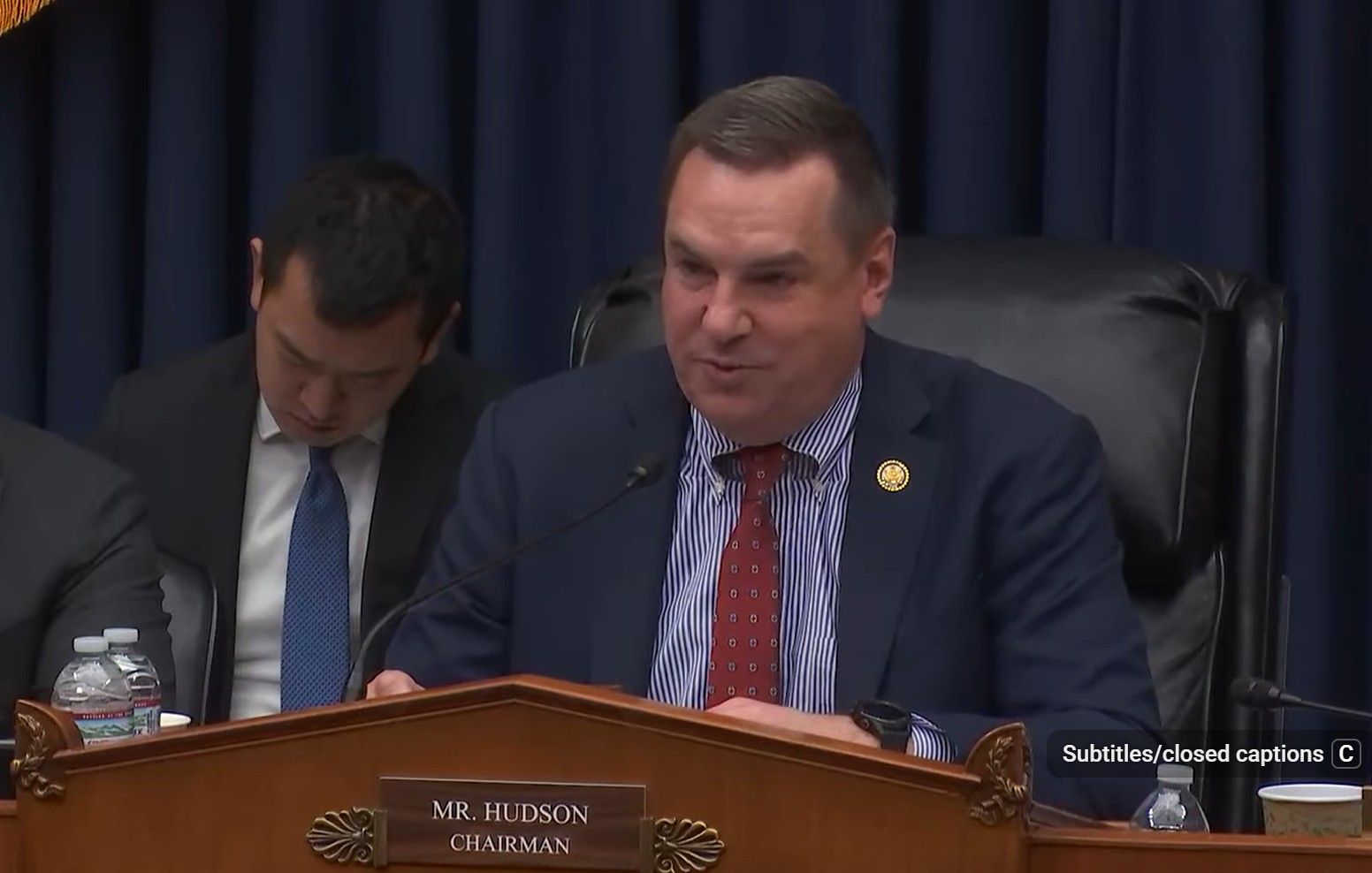
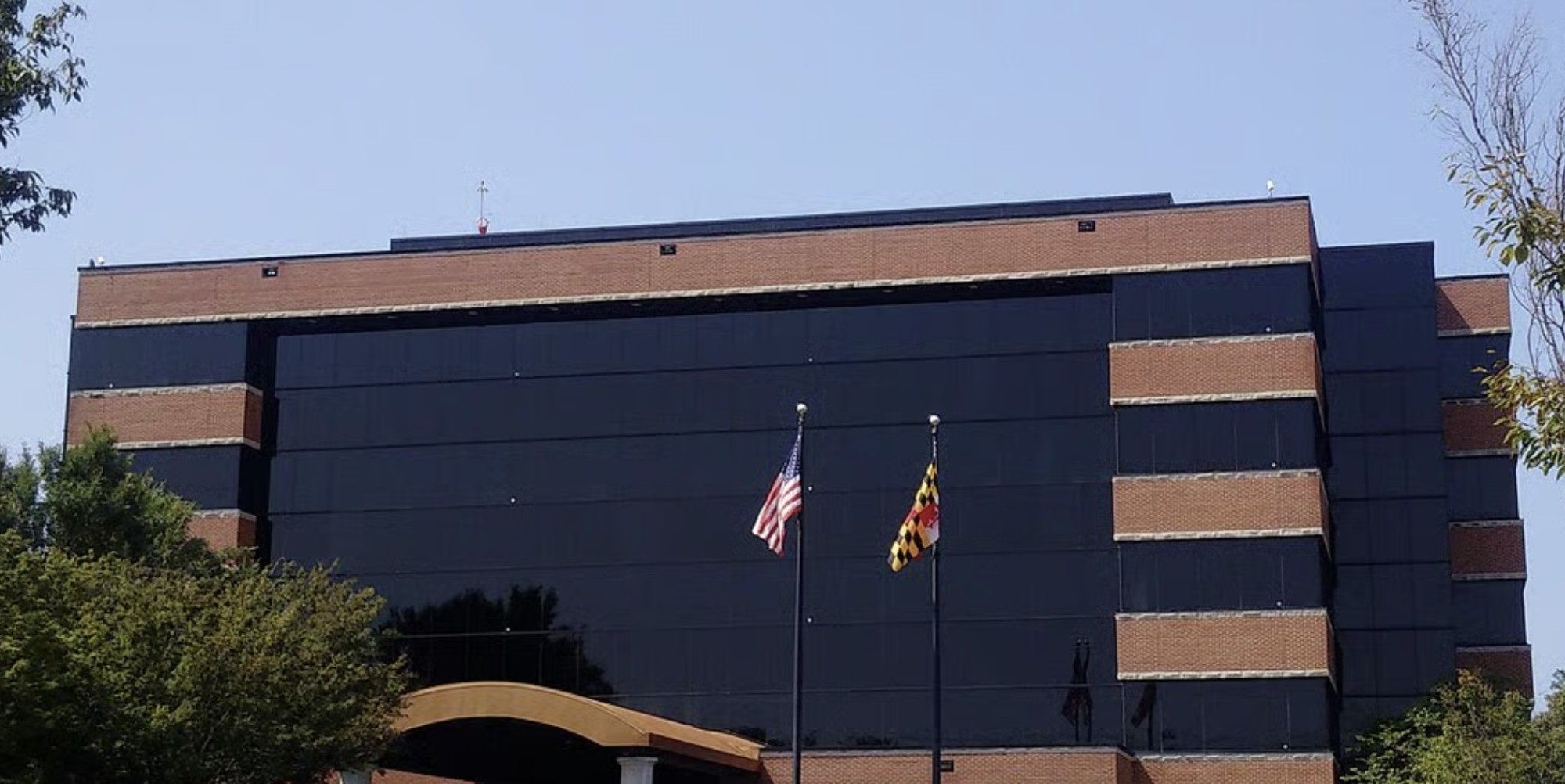
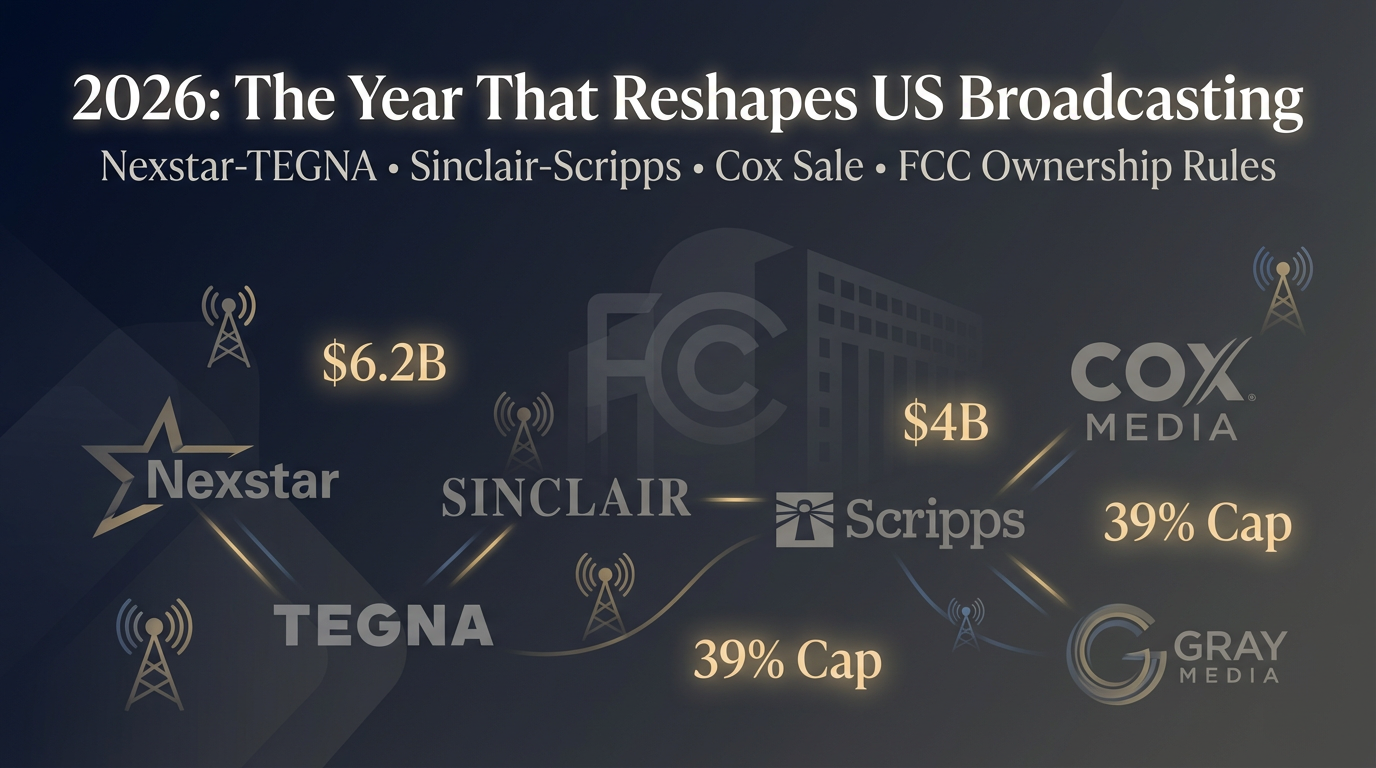
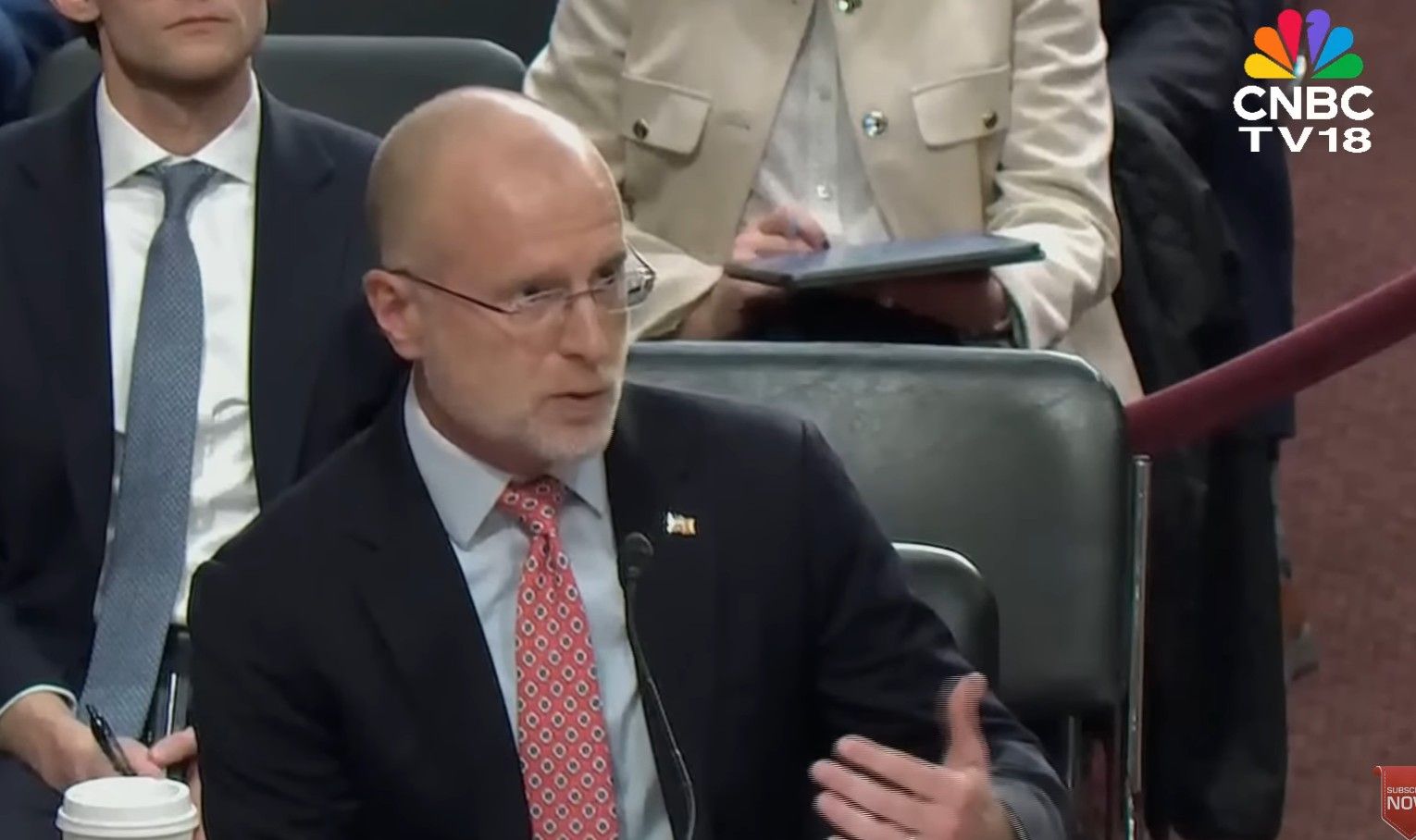

![[2026엔터테크] 윤리적 AI 스튜디오 종합 보고서](https://cdn.media.bluedot.so/bluedot.kentertechhub/2026/01/ylqs2w_202601040723.png)
![[심층분석] 디즈니-OpenAI 10억 달러 딜이
K-콘텐츠 산업에 던지는 시사점](https://cdn.media.bluedot.so/bluedot.kentertechhub/2025/12/qz7dim_202512301210.jpeg)

![[CES2026]엔터테크 전문 투어&트렌드 현장 리포트(무료)](https://cdn.media.bluedot.so/bluedot.kentertechhub/2025/12/5x46lj_202512261120.png)
![[보고서]디즈니의 IP 플라이휠, 1957년 메모에서 시작된 100년 전략](https://cdn.media.bluedot.so/bluedot.kentertechhub/2025/12/vtekpo_202512140501.png)
![[리포트]글로벌 스트리밍 대전환과 FAST 시장의 부상](https://cdn.media.bluedot.so/bluedot.kentertechhub/2025/12/7jw8up_202512120304.png)
![[보고서]K-콘텐츠, 몰입형 공간 새로운 경험](https://cdn.media.bluedot.so/bluedot.kentertechhub/2025/12/je15hi_202512061434.png)

